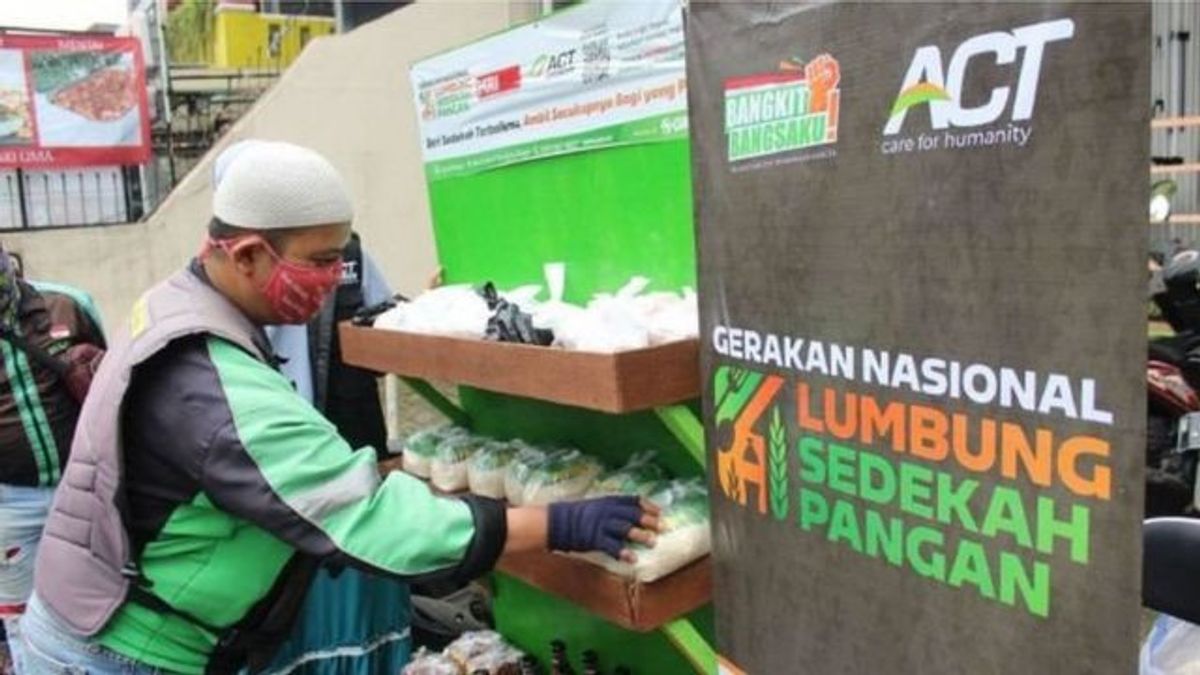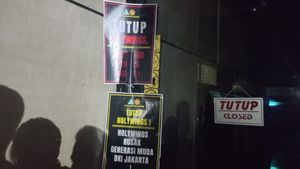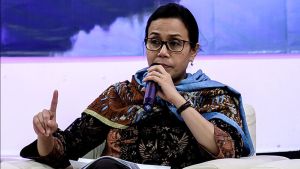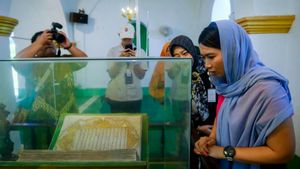JAKARTA - What happened to ACT? Is there really a misappropriation of funds? Was there really a leadership coup? Is this just an internal conflict that is intentionally exaggerated? Or is it just an attempt to 'impeach' certain political parties? Many questions arose. Not to mention the findings of the Financial Transaction Reports and Analysis Center (PPATK) related to the flow of ACT funds leading to terrorist organizations.
Everything is still just conjecture. It still requires further study and exploration. However, at least, the issue has hurt the hearts of the benefactors and raised pros and cons in the public sphere.
The hashtags Don't Believe ACT and Kami Believe ACT have even become a trend on Twitter in the last few days. Those who are disappointed think that ACT is only an institution that sells religion only to enrich themselves and their groups. "Disband ACT Aksi Cepat Tanggap, selling in the name of Religion for the benefit of the elite pocket," tweeted @gante_nasar, Monday (4/7).
"This tilep fast action, WTP 14 years old??? The management's income and vehicles are like Alphard, CRV, Pajero which donated Honda Beat, Yamaha Mio, Jaklingko. Morning deception world," added @bobby_risakotta on the same day.
Not a few of the blue tick twitter accounts are also chirping. For example, @GunRomli on Wednesday (6/7), “ACT: Action is Just a Trick. Received hundreds of millions of funds, which was submitted only 3 million. How dare to take advantage of the calamity & pain of people but for their own interests. The most despicable life, cutting off donations by taking advantage of the suffering of others."
Also, Minister of Religion Yaqut Cholil Qoumas through his personal account @YaqutCQoumas who said, "If indeed humanitarian funds are diverted for non-humanitarian purposes or even to support terrorist activities, ACT's permit must be revoked!"

As for those who support it, they think that the ACT case is too politically charged. It's been happening since the previous management, but why did it only go viral when the new management started?
They also compared the ACT cases with corruption cases in government institutions. For example, what happened at the Ministry of Social Affairs and the alleged corruption in the IDR 2.5 trillion Islamic boarding school aid fund at the Ministry of Religion. "The Ministry of Religion understands the main tasks or functions or does it fail to reason? Allegations of 2.5T corruption at the Ministry of Religion which he led, it has been more than 30 days without any comments? (IF IT DOES)#ACT has only been 3 days and it's fierce! *ambigubinabsurd," tweeted @ZAEffendy, Thursday (7/7).
“In SOEs there are also many problems with corruption cases, but no one is shouting that SOEs must be frozen and dissolved. So it's the same with ACT, if there's a thief/corruptor in ACT, then cut off his hand, don't let ACT be disbanded. Sane Situ?” said @abu_waras, Tuesday (5/7).
Misappropriation of funds has always been a sensitive issue for the Indonesian people. Especially when it happens in popular institutions. It is undeniable that ACT has indeed become the top philanthropic institution in Indonesia. Since its establishment in 2005, its existence has continued to grow so that it can transform into a global humanitarian institution with a wider reach.
The act.id website states that the reach of ACT's global program activities has reached dozens of countries around the world. The amount of funds raised can also reach hundreds of billions of rupiah per year.
Look at the financial report data for the 2010-2020 period of the Aksi Cepat Tanggap Foundation. The amount of humanitarian funds managed by ACT continues to increase. From only IDR 25 billion in 2010 to more than IDR 500 billion in 2020.
The taller the tree, the stronger the wind blows. In the midst of its popularity, came the surprising findings. Starting from the salary list for ACT officials with fantastic amounts that reach hundreds of millions of rupiah, founders of IDR 250 million, Senior Vice President of IDR 150 million, Vice President of IDR 80 million, and Executive Director of IDR 50 million. Until, the findings of the flow of ACT funds to high-risk countries in terms of terrorism financing.
PPATK immediately conducts an audit. It turns out that, not only institutionally, there are several individuals within ACT who are suspected of having separately made transactions to several countries and to several parties for purposes that are still being investigated further.
“For example, one of the administrators made a fund transfer transaction for the 2018-2019 period of almost IDR 500 million to several countries, such as to Turkey, Bosnia, Albania, and India. Some transactions are carried out individually by the administrators," explained Ivan Yustiavandana, Head of PPATK at a press conference, Wednesday (6/7).
During this period there were also employees who carried out transfers of funds to countries with high risk of terrorism financing. Seventeen transactions worth IDR 1.7 billion. Between IDR 10 million-IDR 552 million.
Among other things, towards one of the 19 people arrested by the Turkish government for alleged members of Al Qaeda. "This is still suspected, it should be suspected that the party concerned has been arrested, as one of 19 people arrested by the police in Turkey for being associated with Al Qaeda," said Ivan.
Another finding, PPATK also indicated that funds were managed with a business to business system before being distributed to beneficiaries. Thus, the funds disbursed are no longer real, but the results of business profits.
“There are indications of financial transactions involving corporate entities with the ACT Foundation worth IDR 30 billion. However, when investigated, the company is still within the scope of the founders of ACT. It turns out that the transaction revolves between the owner of the company who incidentally is also one of the founders of the ACT Foundation,” added Ivan.
On that basis, PPATK took firm action to block 60 accounts in the name of the ACT foundation entity spread across 33 banks. It's just a quick step to ease the polemic in society. In fact, on Thursday (7/7), INTRAC has temporarily suspended transactions in 141 CIF in more than 300 accounts owned by ACT spread over 41 financial service providers.

PPATK tracing from 2014 to July 2022, ACT received donations from abroad of more than IDR 64 billion. Meanwhile, there were funds out of Indonesia amounting to more than IDR 52 billion.
The findings also made several government agencies 'on alert'. Among others, Detachment 88 Anti-terror Police. "Densus 88 is intensively working to explore these transactions," said Head of the Banops Detachment 88 Anti-terror Police Kombes Pol Aswin Siregar to reporters, Thursday (7/7).
In fact, the Criminal Investigation Unit of the National Police Headquarters, Friday (8/7) summoned the former ACT President Ahyudin and the current ACT President, Ibnu Khajar to provide information regarding the alleged misappropriation of community donation funds collected by ACT.
Then, the Ministry of Social Affairs immediately acted quickly by revoking the permit for the Implementation of the Collection of Money and Goods (PUB). It is stated in the Decree of the Minister of Social Affairs of the Republic of Indonesia Number 133/HUK/2022 dated July 5, 2022 which was signed by the Minister of Social Affairs Ad Interim Muhadjir Effendi.
This, said Muhadjir, was because there were indications of a violation in the Ministry of Social's rules regarding business financing from collecting donations which should have been 10 percent. In accordance with Government Regulation No. 29/1980 concerning the Implementation of Contribution Collection, Article 6 paragraph 1. Meanwhile, ACT uses an average of 13.7 percent of the funds raised from the collection of funds to finance its operations.
ACT's Self Defense
ACT President Ibnu Khajar immediately opened his voice to respond to various negative issues against the institution he leads. At least, there are six points of clarification.
First, related to ACT's financial condition. Until now, said Ibnu, in good condition. Always consistent since its establishment in 2005 and has always received the title of Unqualified (WTP) from the results of audits of disciplinary institutions which are carried out every year.
“This is an important point as well as showing that our financial management is running well. We also publish the results on the website act.id as ACT's transparency to the public," said Ibnu in a press statement at the ACT Building, Menara 165, Jakarta, Monday (4/6).
Second, regarding the institution's human resources, which are currently in good condition with extraordinary work. “At the beginning of 2021, we have 1688 HR. Then, reduced in July 2022, only 1128 human resources, "added Ibnu.
Third, related to the issue of the coup. Ibn confirms that it is not true. Indeed there are a number of problems that occur. Especially, regarding institutional policies. Many branch and regional leaders had different opinions with the then president, Ahyudin, who had a one-man show leadership style and tended to be authoritarian.
However, it can be solved either way. There is a collective awareness from all elements of ACT's leadership to improve the shortcomings that exist in the institution.
Ibnu explained the chronology, “On January 11, all institutional leaders came to Jakarta to give advice and input to the previous leaders on several conditions. We are grateful with grace, the previous leader signed a letter of resignation. So if there is an issue regarding abusive words, pointing at them, we will tell you that they did not happen in that forum.”

After the resignation letter, then on January 20, 2022, a supervisory meeting was held to change the management structure and the foundation deed. "We invited Mr. Ahyudin. But he happened to be out of town. Through WA (Whatsapp), he conveyed that he gave the power to all of us to continue the process well."
Fourth, regarding facilities and salaries. ACT, previously, had operational vehicles in the form of Alphard and Pajero cars. Alphard is used as a service facility for important guests. Meanwhile, Pajero is for heavy tracks, considering that ACT's humanitarian actions are not uncommon in remote areas with less than ideal access. So, you need a powerful vehicle.
"However, since the new management, precisely in February 2022, we have sold the car to cover the responsibility of the institution. Since January, we have downgraded all operational facilities. Foundation chairman level, Innova. It's also rented. Some of the directors (vice presidents) we provide work operations in the form of Avanza or Expander. Most of them are still rented,” explained Ibnu.
Likewise about salary. Adjustments have been made, decreasing 50-70 percent from the previous. Regarding the information on the fantastic salary figures for ACT officials circulating in the community, Ibnu emphasized that it was not correct.
"The figures that are circulating are only plans that will be carried out in 2021. It has only been carried out for one month in January. After that, there were many changes, our salary structure adjusted to the friendship funds we collected. So, the circulating data is not fully operational and is not permanent. Even if there is a fraud, it is impossible for us to continue to get the WTP predicate," continued Ibnu.
Currently, the salary of the ACT Presidium is no more than IDR 100 million for an institution that manages 1,200 employees.
Fifth, related to institutional operational funds. In the 2017-2021 period, the use of institutional operational funds was only 13.7 percent. How much is appropriate for the institution to take operational funds? Ibnu said that in the context of zakat institutions, according to sharia, it is 1/8 or 12.5 percent. “Why 13.7 percent? Because what we manage is not a zakat institution, but also general donations.”
The percentage was also obtained from the results of joint consideration of the Shari'a Council. “We have 78 branches in Indonesia and we have also been active in 47 countries around the world. Of course, more operational funds are needed when carrying out humanitarian actions. If more, we take part of the non-zakat funds. In 2020 alone, we have carried out 281,000 actions to 8.5 million people as beneficiaries," continued Ibnu.
VOIR éGALEMENT:
Even so, ACT continues to try to minimize the use of operational funds, so that the benefits will be more felt for those in need.
Ibnu also regretted the issuance of the Decree of the Minister of Social Affairs No. 133/HUK/2022 regarding the revocation of the permit for the collection of donations to the ACT Foundation in South Jakarta on Wednesday (6/7/2022). It's too reactive
In fact, one day earlier, several ACT representatives had been cooperative in responding to the Ministry of Social's summons and explaining in detail the conditions that occurred. "We have also prepared whatever is requested by the Ministry of Social Affairs, related to financial management," he said.
If you look at the Regulation of the Minister of Social Affairs of the Republic of Indonesia No. 8/2021 concerning the Implementation of the Collection of Money or Goods (PUB) article 27, the process of revocation of permits should be carried out in stages. The legal team of the ACT Foundation Andri TK detailed, first a written warning. It must be given to PUB organizers at most three times with a maximum grace period of seven days between one warning and another. Then the suspension of the permit, then the revocation of the permit.
"This is where we wonder why the decision to revoke the permit was made so quickly," said Andri as quoted from the official ACT website.
Ibnu admits that the polemic regarding the management of ACT funds is actually the result of the previous leadership. Without wanting to throw responsibility, he emphasized that his party is ready to open up and invite all parties to audit.
“This collective leadership is clear evidence that we are trying to make improvements, especially in managing the funds that have been raised. All decisions are now made on a collegial collective under the supervision of the Supervisory Board," he said.
Sixth, the flow of funds to terrorists. Ibnu emphasized that ACT has nothing to do with terrorist organizations. ACT never looks at the flag, religion, ethnicity, or anything else when taking action. All only on the basis of humanity.
"We have never dealt with terrorists. Humanity should not ask who to help. Like in Syria, we never asked if they were Shia or ISIS," he said.
Ibnu admits that the issues that have emerged to the public are not all wrong. “Some of what was said was true, but not all of it was true.”
There are indeed some problems within the institution. However, the most important thing is the spirit and commitment of ACT at this time to make improvements. "We sincerely apologize to the public. Maybe there are some people who have time to read the news and are not comfortable, we offer our deepest apologies.”
Appropriateness 13.7 Percent
The use of ACT's operational funds, which reached 13.7 percent in the 2017-2021 period, attracted greater public attention. This is because this percentage leads to allegations of misappropriation of funds. Before investigating further, the public must first understand what ACT is registered as an institution.
If registered as a zakat institution, the guidelines are regulations of the National Amil Zakat Agency. However, despite having a number of spiritually based social programs such as qurban, zakat, and waqf, ACT is not a zakat institution and is not registered with Baznas.
When referring to the Regulation of the National Amil Zakat Agency Number 1 of 2016 concerning Guidelines for the Preparation of Work Plans and Annual Budgets of the National Amil Zakat Agency, the Provincial National Amil Zakat Agency, and the Regency/City National Amil Zakat Agency, this amount does not violate the rules.
Chapter IV Amount of Amil Rights Article 8 (1) Acceptance of Amil Rights from Zakat funds is a maximum of 12.5 percent of the receipts of Zakat funds. (2) In the event that the receipt of amil rights from Zakat funds as referred to in paragraph (1) is insufficient, operational costs may use the allocation of infaq/alms and DSKL funds at a maximum of 20 percent of infaq/alms and DSKL funds receipts. (3) The receipt of Amil Rights or operational funds from the CSR Fund is adjusted to the provisions of laws and regulations.
However, based on act.id, ACT is a foundation engaged in social and humanitarian fields. Ratified by the Ministry of Law and Human Rights through Decree Number C-1714.HT.01.02.TH 2005 Dated November 1, 2005.
And received an operating permit from the DKI Jakarta Provincial Government through letter number 155/F.3/31.74.04.1003/-1.848/e/2019 which is valid until February 25, 2024.
ACT also has a PUB (Money and Goods Collection) permit from the Ministry of Social Affairs through the Decree of the Minister of Social Affairs Number 239/HUK-UND/2020 for the general category and number 241/HUK-UND/2020 for the Disaster category, the permit is always renewed every 3 years. (three) months in accordance with the provisions in force in Indonesia.

As a result, the guidelines, among others, refer to the rules of the Ministry of Social Affairs. Obviously, in the Ministry of Social's rules, 13.7 percent violates the rules.
In the Government Regulation of the Republic of Indonesia Number 29 of 1980 concerning the Implementation of Collection of Donations Article 6 (1) Financing of efforts to collect donations is a maximum of 10 percent of the results of the collection of the relevant donations.
Article (2) The income from the collection of contributions referred to in Article 5 as well as the amount of money donated, with the permission of the Minister of Finance may be exempted from taxes and other levies.
Article (3) The implementation of the provisions of paragraph (2) shall be further regulated by the Minister of Finance.
As a foundation, ACT is also bound by the Law of the Republic of Indonesia Number 28 of 2004 concerning Amendments to Law Number 16 of 2001 concerning Foundations.
Article 5 (1) Foundation assets, whether in the form of money, goods, or other assets obtained by Foundations based on this Law, are prohibited from being transferred or distributed directly or indirectly, either in the form of salaries, wages, or honorariums, or other forms can be valued in money to the Trustees, Management and Supervisors.
(2) Exceptions to the provisions as referred to in paragraph (1), it can be determined in the Articles of Association of the Foundation that the Management receives a salary, wages, or honorarium, in the event that the Foundation Management: a. not the founder of the Foundation and not affiliated with the Founder, Trustees, and Supervisors; and b. carry out the management of the Foundation directly and fully.
(3) The determination of the salary, wages or honorarium as referred to in paragraph (2) shall be determined by the Trustees in accordance with the ability of the Foundation's assets.
Violation of the Act can be snared with criminal sanctions in the form of imprisonment for a maximum of 5 years. Violating foundation organs may also be subject to additional penalties in the form of an obligation to return money, goods, or foundation assets that are transferred and distributed (Article 70 of the Foundation Law).
Whatever the decision later, right or wrong, don't let this case cause public distrust of other philanthropic institutions. Don't let this case lead to religion. Just because of the actions of unscrupulous people, people's belief in religion fades.
The English, Chinese, Japanese, Arabic, and French versions are automatically generated by the AI. So there may still be inaccuracies in translating, please always see Indonesian as our main language. (system supported by DigitalSiber.id)


















